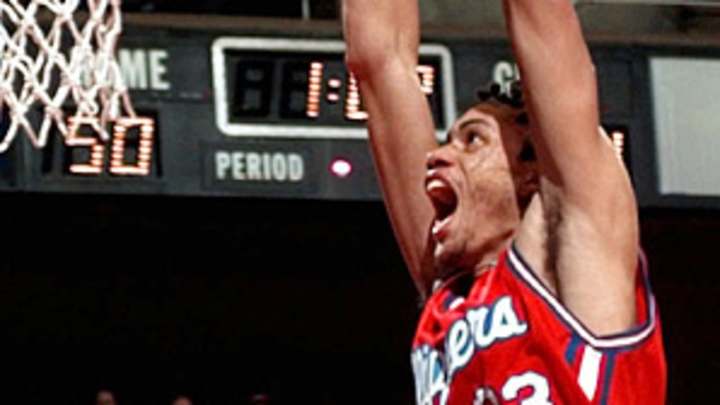Closs gets his life in order after drinking sabotaged NBA career


You remember Keith Closs? Maybe you don't. He was one of those cult figures the NBA seems to have a singular knack for producing. A backup center for the Los Angeles Clippers from 1997-2000, Closs bore a physical resemblance to the map of Chile, standing 7-3, weighing 212 pounds. He occupied some space, blocked a few shots, wore his hair in various styles -- a mountainous Afro one night, braids the next. He was short on minutes but long on attitude. He was an early victim of the cell phone paparazzi -- "One of the first!" he said proudly -- when he was jumped by an L.A. street gang, the beating caught on video that, inevitably, went viral.
He also drank himself out of an NBA career.
The story of the athlete who gets burned by temptation once he's conferred money and access (and enablers) is, of course, a familiar narrative in sports. That's not the case here.
"I was a blowing alcoholic in elementary school," Closs said. "I was that sneaky kid. An adult would put his cup down and I would take a swig. And there were a lot of drinkers in my family."
Closs drank more in middle school. And still more in high school. He grew physically, surpassing 7 feet early in his teen years, and his tolerance grew in lock step. Then it went down.
"That," he said, "is when it gets really ugly."
His first week on campus at Central Connecticut, Closs recalls getting so drunk that he walked into the wrong house. He was suspended indefinitely from the basketball team. He didn't stop drinking, not by any stretch. But he grew more adept at hiding it and returned to lead the nation in blocks in his two college seasons before turning pro.
At an NBA draft workout with the Lakers, Jerry West and Mitch Kupchak asked Closs if he had a drinking problem.
"I told them 'no,' " Closs said, "and to me at the time, that was the truth. I go out and have a good time. That's all. It was obvious to everyone but me."
In August 1997, the undrafted Closs signed a five-year, $8.5 million contract with the Clippers after a stint in the Atlantic Basketball Association and strong performances with the Lakers' and Trail Blazers' summer league teams. Though he put up modest numbers, he didn't want for confidence. As he once put it to Sports Illustrated: "People have lots of misconceptions about my game, but when we face off, I usually show 'em what the deal is." He was averaging 4.3 points and 2.9 rebounds a game at the time. He bickered with coaches. He was short-tempered. He was suspended multiple times.
"People thought of me as uncoachable with a bad attitude," he said. "That was the drinking."
During the 1998-99 lockout, Closs picked up two DUIs. He called NBA headquarters directly for help. Not recovery help but "how do I get out of this?" help. Nevertheless, the league sent him to a rehab clinic in Georgia. It didn't work.
"I heard these war stories from everyday people but I couldn't relate," he said. "I hadn't lost my job or my family. I'm thinking, 'Hell, I'm not like these people. They're the ones with the problem. I'm young, have money. Once the lockout is over, I'm back in the NBA! You're calling me alcoholic? That's like you're cursing my mother.' "
The viral video? It was drinking that got him in trouble that night in 2000 in the club parking lot. Though the beating looks vicious, Closs says he wasn't hurt at all and, in fact, played the following night against Portland. Looking back, he says, there were plenty of alcoholics in the NBA. If drinking is your thing, there's ample opportunity.
"Some players hide it better than others," he said. "Some are high-profile names and so [teams] overlook it."
Closs was not a high-profile name. The Clippers cut him loose in 2000. He pinballed around the basketball netherworld for years. A few months with the Globetrotters. ABA, CBA, overseas. Drinking all the while.
Closs' moment of reckoning came in 2007. He had recently turned 30 and had designs of making a comeback. He came down with pancreatitis, caused by all those years of drinking. He lost 30 pounds and weighed well under 200, scary given his height.
"I thought I had a high pain threshold," he said. "This thing nearly killed me."
After almost two decades of denial, he finally decided to get treatment. He's been going to Alcoholics Anonymous meetings ever since. Next month, he says, he'll celebrate four years of sobriety.
Closs is 35 now, married and living in Los Angeles. He's also healthy, fit and still 7-3. Which means he can still play basketball. He recently played in something called the West Coast Basketball League. Along with his buddy Priest Lauderdale (another NBA cult figure), he is looking into playing in China or Australia. He is sufficiently self-aware to know that a return to the NBA isn't realistic.
The sting of knowing he sabotaged a career is offset by the pride he takes in his recovery.
"I was sloshing my way through life in a drunken stupor, I got my ass kicked and I was lucky enough to see what I was doing to myself before it was too late," Closs said. "I look at it that way and life is good, man."
